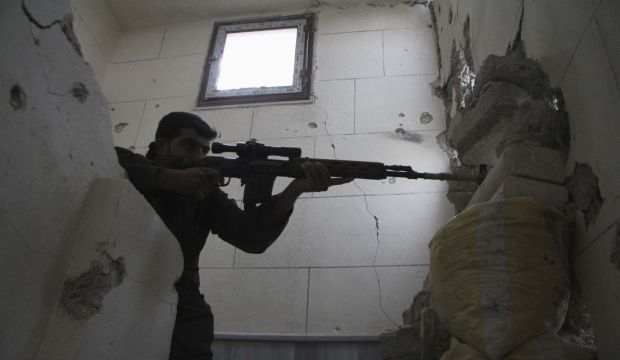
A Free Syrian Army fighter aims his weapon as he takes position in Aleppo’s Karm Al-Jabal district on December 4, 2013. (Reuters/Saad AboBrahim)
London, Asharq Al-Awsat—Ankara mediated a meeting on Thursday between rival factions of the Syrian opposition in an attempt to broker an agreement between the Islamic Front and the Free Syrian Army (FSA) following recent clashes between the two. Turkey’s mediation attempts come after the Islamic Front, an Islamist coalition of Syrian rebel groups, raided an FSA base, seizing weapons and logistical supplies.
However, the two sides were ultimately unable to reach a solution after a disagreement over the exact amount of weapons in the FSA warehouses stymied Turkish efforts, Syrian rebel sources told Asharq Al-Awsat on the condition of anonymity.
In exclusive comments to Asharq Al-Awsat, Syrian interim Defense Minister Asaad Mustafa described the recent rebel infighting as very dangerous and “a betrayal of the revolution and the Syrian people, who expect us to bring down the regime, not each other.”
Mustafa confirmed he was in contact with FSA chief Gen. Salim Idris, adding that he had called on him to exercise restraint over the recent clashes.
Mustafa insisted that “things are under control,” and that serious efforts are underway to form a national military body to unify all of the rebel groups in a bid to end the state of factionalism that has plagued Syria’s armed opposition.
The recent surge of rebel infighting over territory has threatened to drag the country into further violence and instability, with the prospect of a three-front civil war erupting in the country.
Speaking to Asharq Al-Awsat on the condition of anonymity, FSA sources affirmed that a new military coalition, set to be named Jabhat Al-Ahrar (the Free Front), will soon be established to unify all of the Syrian rebels that support the FSA.
The newly formed Islamic Front is an Islamist coalition made up of Liwa Al-Tawhid, Ahrar Al-Sham, Soqour Al-Sham, the Al-Haq Brigades, Ansar Al-Sham, the Army of Islam, and the Kurdish Islamic Front. It does not include the Al-Qaeda-affiliated Al-Nusra Front or the Islamic State of Iraq and Syria (ISIS). Many analysts believe that the Islamic Front now represents the strongest rebel militia on the ground in Syria, posing a threat to the authority of the FSA, which is backed by Western governments.
The Syrian National Coalition, also backed by the West, denied that any clashes had taken place between the Islamic Front and the FSA, claiming that it had asked the Islamist coalition to protect the warehouses from radical Islamist attackers.
This has led outside observers to view the statement as a face-saving attempt on the part of the Coalition, the main umbrella group for the Syrian opposition that controls the FSA, regarding divisions between Syria’s rebel factions.
On Wednesday, some media outlets claimed Idris had fled Syria to Doha following an attack by the Islamic Front.
The Syrian interim Defense Minister denied the media reports, stressing that Idris remains in Syria, accusing unidentified sides of trying to provoke a conflict between the FSA and the Islamic Front.
In a press conference on Thursday, Syrian National Coalition spokesman Khaled Saleh also denied reports that Idris had fled, affirming that the FSA commander is in the process of meeting with Islamic Front leaders “to find a solution to what happened.”
